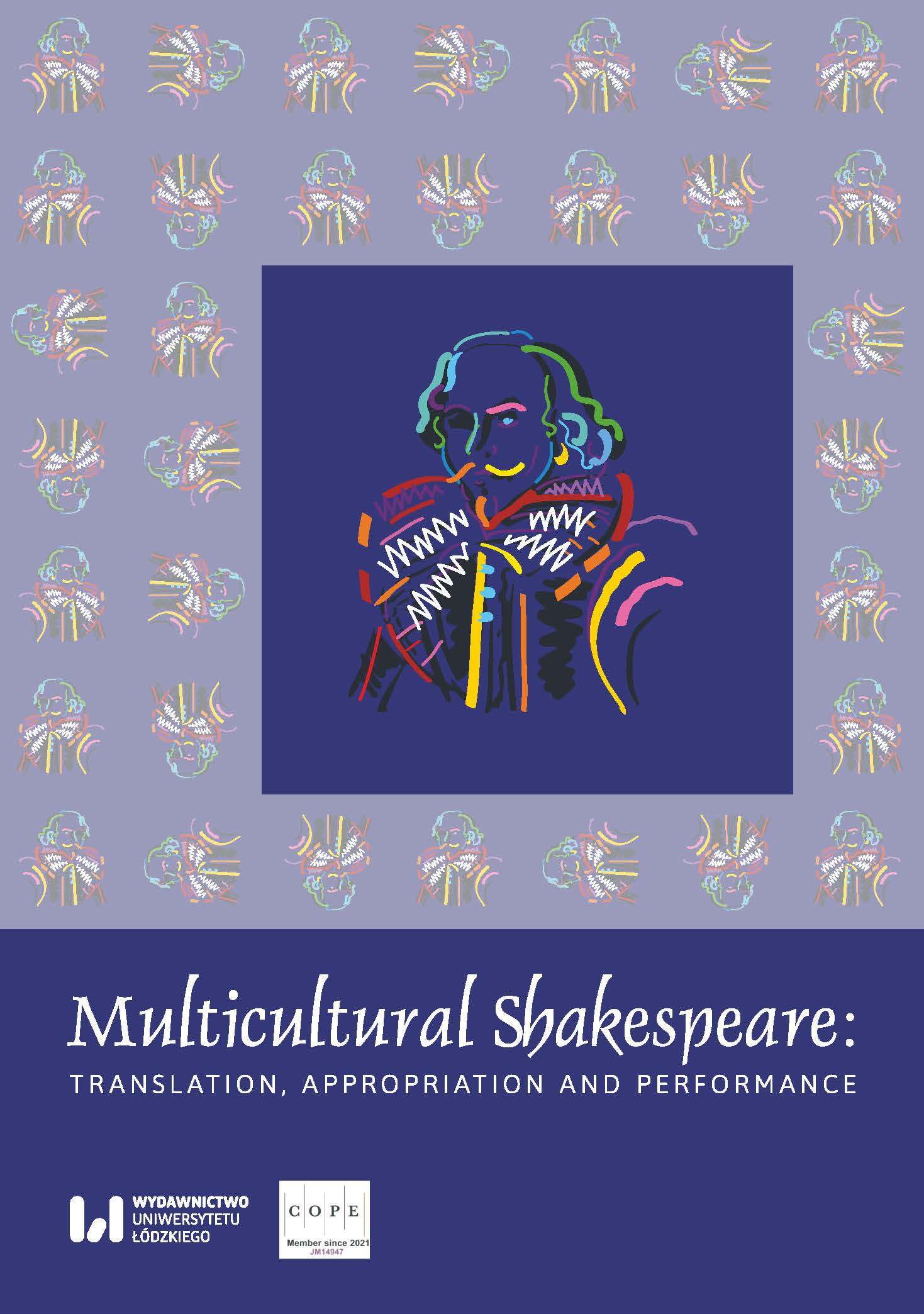Framing Polish-Jewish Relations Through Shakespeare in Post-war and Contemporary Polish Theatre
DOI:
https://doi.org/10.18778/2083-8530.28.10Keywords:
Polish-Jewish relations, Holocaust, antisemitism, Jerzy Grotowski, Krzysztof Warlikowski, 'Hamlet' in Poland, 'Hamlet Study', 'The Merchant of Venice' in PolandAbstract
The paper aims to analyse how the staging of Shakespeare’s texts in post-war and contemporary Poland reflected the indifferent and hostile attitudes of Poles towards Jews, particularly during the Holocaust, and the distortions and gaps in the collective memory regarding the events. In the first part, the author focuses on Hamlet Study (dir. Jerzy Grotowski) performed in 1964 by Laboratory Theatre of 13 Rows in Opole, which is symptomatic of silencing the matter during the communist period. The second part draws from the statement of Jan Ciechowicz, a Polish theatre historian, who claimed that “the Holocaust killed Shylock for Polish stage.” While verifying it, the author analyses selected aspects of three productions directed by Krzysztof Warlikowski (The Tempest (2003), The Merchant of Venice (1994) and The African Tales by Shakespeare (2011)) and juxtaposes them against the background of the changes in collective memory. He argues that the most cogent productions concerning Polish attitudes towards Jews are those that position the audience as witnesses of the acts of re-enacted violence and thus provoke an affective response.
Downloads
References
Barba, Eugenio. Ziemia popiołu i diamentów. Moje terminowanie w Polsce. Trans. Monika Gurgul. Wrocław: Instytut im. Jerzego Grotowskiego, 2001.
Google Scholar
Błoński, Jan. “The Poor Poles Look at the Ghetto.” “My Brother’s Keeper?” Recent Polish Debates on the Holocaust. Ed. A. Polonsky. London: Routledge, 1990. 34-52.
Google Scholar
Bryś, Marta. “Tak się nie pokazuje Zagłady?” Interview with Roma Sendyka, Wojciech Wilczyk and Magdalena Zych. Didaskalia 150 (2019): 56-63.
Google Scholar
Ciechowicz, Jan. “Żydzi i chrześcijanie, czyli o ‘Kupcu weneckim.’” Od Shakespeare’a do Szekspira. Eds. Jan Ciechowicz and Zbigniew Majchrowski. Gdańsk: Centrum Edukacji Teatralnej, 1993. 190-207.
Google Scholar
Engelking, Barbara. Such a Beautiful Sunny Day… Jews Seeking Refuge in the Polish Countryside, 1942-1945. Trans. Jerzy Michałowicz. Jerusalem: Yad Vashem, 2016.
Google Scholar
Fazan, Katarzyna. “Wykluczony, czyli każdy.” Interview with Krzysztof Warlikowski. Didaskalia 107 (2012): 8-14.
Google Scholar
Figzał-Janikowska, Magdalena. “The Circle of Outcasts: Krzysztof Warlikowski’s ‘African Tales by Shakespeare.’” Cervantes, Shakespeare y la Edad de Oro de la escena, Eds. Jorge Braga Riera, Javier J. González Martínez, Miguel Sanz Jiménez. Madrid, 2018. 619-631.
Google Scholar
Fik, Marta. “Szekspir w teatrze aluzji.” Od Shakespeare’a do Szekspira. Eds. Jan Ciechowicz and Zbigniew Majchrowski. Gdańsk: Centrum Edukacji Teatralnej, 1993. 232-243.
Google Scholar
Flaszen, Ludwik. Grotowski & Company. Trans. Andrzej Wojtasik and Paul Allain. Holstebro: ICARUS Publishing Enterprise, 2010.
Google Scholar
Forecki, Piotr. Reconstructing Memory. The Holocaust in Polish Public Debates. Trans. Marta Skowronska. Frankfurt am Main: Peter Lang Edition, 2013.
Google Scholar
Gibińska, Marta. “More than Jan Kott’s Shakespeare – Shakespeare in Polish Theatre After 1956.” On Page and Stage: Shakespeare in Polish and World Culture. Ed. Krystyna Kujawińska Courtney. Kraków: Universitas, 2000. 183-196.
Google Scholar
Grabowski, Jan. Hunt for the Jews: Betrayal and Murder in German-occupied Poland. Bloomington: Indiana University Press, 2013.
Google Scholar
Gruszczyński, Piotr. “‘Opowieści afrykańskie’ – próba zapisu.” Opowieści afrykańskie według Shakespeare’a [theatre programme]. Warszawa: Nowy Teatr, 2011.
Google Scholar
Janicka, Elżbieta. “Obserwatorzy uczestniczący zamiast świadków i rama zamiast obrzeży. O nowe kategorie opisu polskiego kontekstu Zagłady.” Teksty Drugie 3 (2018): 131-147.
Google Scholar
DOI: https://doi.org/10.18318/td.2018.3.8
Kosiński, Dariusz. Grotowski. Przewodnik. Wrocław: Instytut im. Jerzego Grotowskiego, 2009.
Google Scholar
Kott, Jan. Szekspir współczesny. Warszawa: Państwowy Instytut Wydawniczy, 1965.
Google Scholar
Kowalcze-Pawlik, Anna. “Meaningless Acts: Migratory Aesthetics in Krzysztof Warlikowski’s and Paweł Miśkiewicz’s Dystopian Adaptations of The Tempest.” Theatralia 24 (2021): 121-138.
Google Scholar
DOI: https://doi.org/10.5817/TY2021-S-8
Kowalcze-Pawlik, Anna. “‘Baroque Staring:’ Caliban in Polish Theater.” The Shakespearean International Yearbook: Disability Performance and Global Shakespeare. Eds. Alexa Alice Joubin, Natalia Khomenko, Katherine Schaap Williams. London: Routledge, 2024 (forthcoming, courtesy of the Author).
Google Scholar
DOI: https://doi.org/10.4324/9781032649238-5
Niziołek, Grzegorz. The Polish Theatre of the Holocaust. Trans. Ursula Phillips. London: Methuen Drama, 2019.
Google Scholar
DOI: https://doi.org/10.5040/9781350039698
Niziołek, Grzegorz. Polski teatr Zagłady. Warszawa: Instytut Teatralny im. Zbigniewa Raszewskiego, Wydawnictwo Krytyki Politycznej, 2013.
Google Scholar
Niziołek, Grzegorz. Warlikowski. Extra Ecclesiam. Kraków: Homini, 2008.
Google Scholar
Szekspir i uzurpator: z Krzysztofem Warlikowskim rozmawia Piotr Gruszczyński. Warszawa: Wydawnictwo W.A.B., 2007.
Google Scholar
Świątkowska, Wanda. “The Political Hamlet According to Jan Kott and Jerzy Grotowski.” Multicultural Shakespeare: Translation, Appropriation and Performance 17 (2018): 61-68.
Google Scholar
DOI: https://doi.org/10.18778/2083-8530.17.06
Świątkowska, Wanda. Hamleci Jerzego Grotowskiego. Wrocław: Instytut im. Jerzego Grotowskiego, 2016.
Google Scholar
Wójtowicz, Agnieszka. Od “Orfeusza” do “Studium o Hamlecie”. Teatr 13 Rzędów w Opolu (1959-1964). Wrocław: Wydawnictwo Uniwersytetu Wrocławskiego, 2004.
Google Scholar
Wyspiański, Stanisław. The Hamlet Study and The Death of Ophelia. Trans. Barbara Bogoczek and Tony Howard. London: The Shakespeare’s Globe, 2019.
Google Scholar
Żurowski, Andrzej. Myślenie Szekspirem. Warszawa: Instytut Wydawniczy PAX, 1983.
Google Scholar
Downloads
Published
How to Cite
Issue
Section
License

This work is licensed under a Creative Commons Attribution-NonCommercial-NoDerivatives 4.0 International License.












